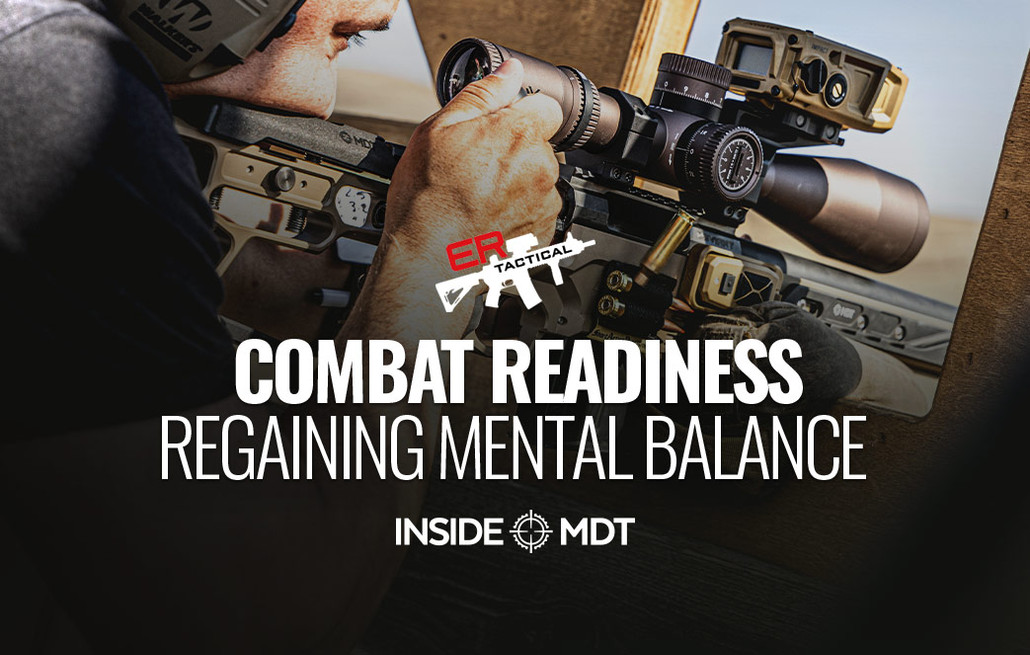Posted by Rob Orgel, Emergency Response Tactical on 2024 Jan 11th
Combat Readiness Regaining Mental Balance - Inside MDT
Editor's Note: This article is geared towards law enforcement and the military, but mental balance, stress management, and adaptability are equally important in both the competition and hunting realms. This article is a great read for those who need to perform at their best.
In combat and high-stress situations, the concept of balance extends beyond physical stability; it encompasses mental equilibrium and emotional composure. Achieving and maintaining the right headspace during a crisis is crucial for effective decision-making and survival. This article reviews the importance of mental balance in combat training, highlighting the need to embrace imperfection, seek professional guidance, and be prepared for the unexpected.
EMBRACING STRESS
Combat and self-defence scenarios often disrupt our mental equilibrium. The chaos, unpredictability, and life-or-death decisions can throw even the most prepared individuals off-balance. To excel in these high-pressure situations, embracing the challenge of being mentally off balance is imperative.
Training for mental balance involves preparing individuals to think clearly and maintain composure when everything around them feels unstable. It mirrors the dynamic nature of combat, where quick thinking and adaptability are paramount.
When you have a malfunction, whether it be weapon-induced or shooter-induced, fix it and continue the shot. It's not a good idea to reset and try again.
STRESS-BASED LEARNING FOR MENTAL BALANCE
Stress-based learning replicates the psychological demands of high-pressure situations and is the cornerstone of mental off-balance training. Here's why it's invaluable:
Competition and hunting are a great tool for managing stress.
SEEKING PROFESSIONAL TRAINING FOR MENTAL BALANCE
While self-training can enhance mental balance to an extent, seeking professional guidance is indispensable. Qualified instructors with experience in combat and self-defense scenarios can provide invaluable mentorship. Here's why it's crucial:
Using a shot timer can create stress and keep us honest as well as the use of "random" start time. Now you or your buddy can't control when the drill begins. This also allows you to time yourself without a buddy.
CONCLUSION: THE MENTAL OFF-BALANCE ADVANTAGE
In the world of combat and self-defense, maintaining mental balance is paramount. Mental off-balance training prepares individuals to think clearly, make effective decisions, and maintain composure when the world around them feels unstable. Combat is not just about physical prowess but psychological resilience and adaptability. By embracing stress-based learning, recognizing the importance of mental balance, and seeking professional guidance, individuals can equip themselves with the mental skills and mindset necessary to excel in the tumultuous world of self-defense. In a world where unpredictability is the norm, mastering mental off-balance training can be the key to survival and success in high-pressure situations.
HUMAN PERFORMANCE RESOURCES FROM MDT
- Team MDT 2023 PRS Season Results
- A Journey of Practice
- Mastering the Mental Game of PRS
- Dry Fire Drills with Pro Shooter Allison Zane
- Eye Dominance and Handedness Maximizing Speed and Efficiency
- Are You Ready for Your Hunt?
- Starting Over
- Keep Calm and Shoot On: How to Manage Stress
- Maximize Performance with Mental Imagery
- Practical Considerations Of Competitive Shooting
- A Shooter's Checklist - Delivering The Perfect Shot
- How To Shoot PRS: Stage Breakdown With PRS Top Lady
- Dry Fire Drills With Pro Shooter Allison Zane
- Confidence Kills
ABOUT THE AUTHOR
Rob Orgel enlisted in the USMC in 2004 as an Infantry Rifleman (0311), serving with 3rd Bn 1st Marines in Iraq, including roles as a point man in OIF-3 & team leader in OIF-6. Later, he joined the 1st Marine Regiment, achieved the rank of Sergeant in 2010, & continued service in Afghanistan. Upon returning, he became a Combat Instructor at the School Of Infantry West. Transitioning to private military contracting with Securing Our Country (SOC), he instructed at the American Embassy in Iraq. In 2018, Rob became Chief Instructor at GPS Defense Sniper School, revamping their program. Now, as owner & lead instructor at Emergency Response Tactical, he focuses on training novice to advanced shooters on the range over 300 days a year.


 CAD
CAD
 Euro
Euro
